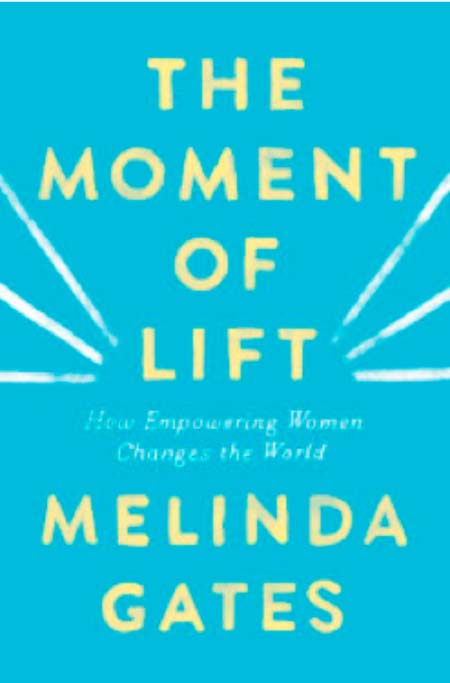
Reviewed
by Molly Brown
In
the past two decades, Melinda Gates has worked on some of the greatest
challenges in global health, including making vaccinations and family planning
more widely accessible. In her new book, The Moment of Lift: How Empowering
Women Changes the World, she pulls everything she’s learned together to come up
with one major takeaway: When we lift up women and girls everywhere, it
benefits us all.
Before
you dismiss this as another social justice do-gooder book by a wealthy white
woman, don’t. Gates’ book is a smart, thoughtful and passionate look at the
problems behind inequality among some of the most marginalized populations in
the world.
To
build her case, Gates uses her on-the-ground experiences, the stories of the
extraordinary people she meets, and what she’s learned at Microsoft and the
Gates Foundation. She also gets personal, sharing her stories as a daughter,
student, wife and mother.
Oh,
and there’s plenty of data and research to back it all up.
Gates’
overall message is that we must lift women and children, especially young
girls, above the many excruciating obstacles they face and give them the power
to shape their lives. In turn, women who have power to make their own choices
pay it forward in their communities, which helps everyone lead happier,
healthier lives. If this all sounds a little too idealistic — after all, what
does a poor woman in Africa have to do with your happiness? — Gates is here to
tell you why it matters.
Time
and again, the people and organizations Gates supports show that when societies
allow women more power of their lives, it translates into better communities
for all. Businesses are built, children are educated, agricultural advances are
implemented, and modern healthcare practices prevail. When women are allowed to
make decisions, they tend to choose things that benefit their families and
communities, lifting everyone up, “Because sometimes all that’s needed to lift
women up is to stop pulling them down.”
Advocate
for basic rights in the worst circumstances
While
the Gates Foundation had focused on vaccinations and maternal healthcare for
years, Gates writes that her first major step as a public advocate was with
their family planning initiatives. Through their work with vaccinations, they’d
learned that when women were in charge of their reproductive health it allowed
them to space pregnancies and control the number of children they had,
resulting in healthier children and families. “It took us years to learn that
contraceptives are the greatest life-saving, poverty-ending, women-empowering
innovation ever created,” she writes.
As
a Catholic, Gates took a lot of heat for her belief that all women need access
to contraceptives, but she held her ground, and in many ways, this is the
moment when Gates stepped out from the Foundation to become the leader she is
today. The contraceptive battle marked “just the beginning” in her work for
women. She realized that gender equity — getting girls to school, letting women
run their own businesses — would be essential to lifting women up.
“As
women gain rights, families flourish, and so do societies,” she writes. “That
connection is built on a simple truth: Whenever you include a group that’s been
excluded, you benefit everyone. And when you’re working globally to include
women and girls, who are half of every population, you’re working to benefit
all members of every community. Gender equity lifts everyone.”
Travelling
and talking with women about family planning and contraceptives laid bare many
more of the worst atrocities women face worldwide: Female genital cutting,
child marriage, rape, domestic violence, unpaid labour, sex work. Gates’
stories of meeting these women are heartbreaking but necessary reading,
especially for people in the West who may not be as aware of these common
practices as they should be. Extreme poverty and isolation is devastating to
women and makes it almost impossible for them to provide for and protect their
children. As a result, the cycle of abuse and poverty continues.
Often
when Gates and her colleagues go into communities suffering from these
troubles, there are simple tools and techniques — access to education being one
of the most vital — they can use to help, but it doesn’t come down to that. As
she writes, you can’t go in and fix problems for people, you must listen and
work with the people they trust from within. “It’s a delicate thing to initiate
change in a traditional culture. It has to be done with the utmost care and
respect … Local people have to lead.”
Women’s
rights in the U.S.
Despite
our many gains in the United States, we are still in perilous times with
women’s rights, especially when it comes to access to birth control and
family-planning clinics. We still haven’t achieved pay equality. We still don’t
have paid maternity leave. We still don’t support working moms (and dads) as
much as we could or should. And women are still discriminated against and
harassed in the workplace.
Gates
spends quite a bit of time discussing inequalities in America, including the
current administration that is “working to dismantle programs that provide
family planning and reproductive health services.” She argues that eliminating
programs that serve teens and low-income women is a huge mistake. “It’s the
mark of a backward society — or a society moving backward — when decisions are
made for women by men.”
Gates
shares her own history of battling for equality. Before her marriage to Bill
Gates, she admits that she was in an abusive relationship, which stripped her
of her sense of power and confidence. After she married Bill and had her first
child, she realized that parenting, even with a lot of help, comes with its own
disparities in workload.
At
one point, she’s so frustrated with the imbalance of parenting work that she
complains to Bill about driving their daughter Jenn back and forth across the
bridge to school. Bill said, “I can do some of that,” adding that he’d love to
spend the extra time talking with his daughter. The result? Melinda starts
noticing other fathers doing more of the school driving. “So I went up to one
of the moms and said, ‘Hey, what’s up? There are a lot of dads here.’ She said,
‘When we saw Bill driving, we went home and said to our husbands, Bill Gates is
driving his child to school; you can, too.’ ”
At
Microsoft, Gates admits that her success came from having a wonderful female
boss who encouraged her to be herself and follow her style, even in the
high-pressure early days. “If I had tried to do it on my own without colleagues
who encouraged me and a boss who supported me, I would have failed,” she
writes.
She
talks about how the tech industry has a long way to go to work on gender biases,
which start in childhood as boys are more encouraged to play with computers and
video games. The gender biases only increase from there, throughout school and
into the workplace.
For
Gates, she’s seen that when women stand together to tackle hostility, work for
pay equality, and career advancement, they tend to get further, especially with
the #MeToo movement. Her argument for including women goes beyond the tech
workplace. Women need to have more access to VC money, and women need to be a
part of research and development for important advancements like AI to avoid
bias being programmed into the technologies.
As
she puts it, “It matters who writes the code.”
The end goal
Girls
who go to school feel more confident and powerful. Women who are allowed to choose
if and when they have children are more powerful. These women then work for the
betterment for all lives in their communities, creating a tide of positive
change that ripples throughout.
So,
like the Beatles said, all you need is love? Sounds simple, but Gates argues
that it’s true. In summary, equity is a goal but it’s not the goal: “The goal
is for everyone to be connected. The goal is for everyone to belong. The goal
is for everyone to be loved.”
No
one is more aware of what it looks like when billionaires sweep in to solve the
problems of people who live on the poorest and most neglected margins of
society than Gates. She openly acknowledges this, wrestles with the concept,
and defers to experts in their fields on every point who know more than her.
She
also openly acknowledges the head starts, good luck and privilege that has
helped both her and Bill succeed. There is an authenticity to both Melinda and
Bill’s need to learn more about the “why’s” and their wish for positive,
peaceful change that resonates in every chapter.
And
if it takes the story of a “rich American lady” to push these issues forward,
bring it on. Gates is doing the important work right now she was meant to do:
Directing much-needed attention and resources to women’s issues on a global
scale. The Moment of Lift is an important primer as to where we’re at in this
fight — and what everyone can contribute for a better future for all.
Available
at Timbooktoo tel 4494345
Read Other Articles In Article (Archive)
Man arraigned for alleged stealing
Mar 2, 2015, 10:03 AM



